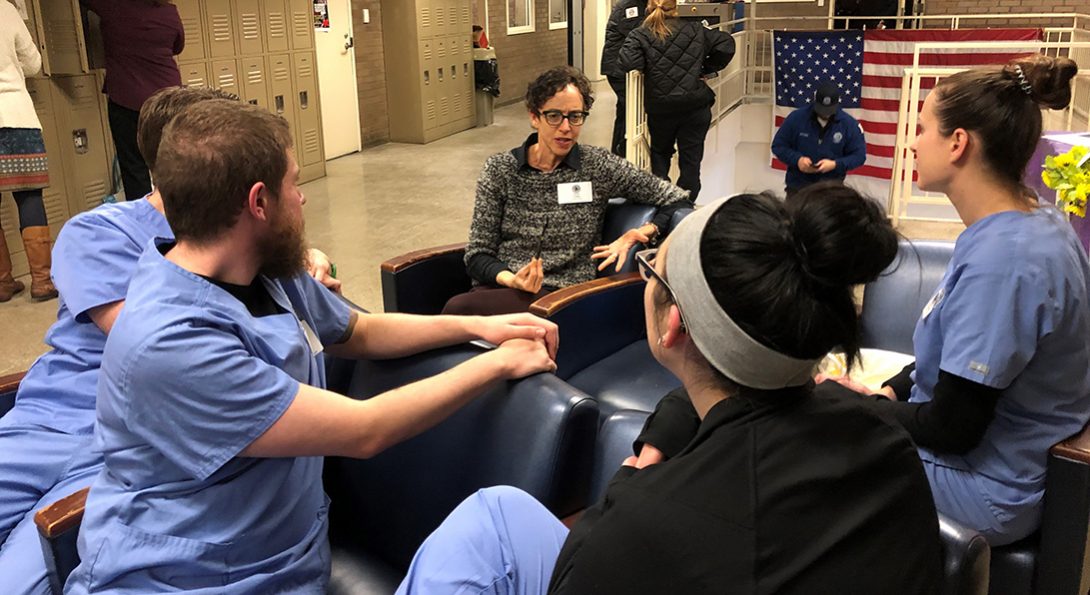Nursing students bring health education to Juvenile Detention Center

Through weekly visits, graduate-entry master's and DNP students are teaching young people at Chicago's Juvenile Detention Center about sensitive health topics
body copy

At Cook County’s Juvenile Temporary Detention Center, about 20 of the residents are sitting in the facility’s media room and sticking out their tongues at each another.
“Can you do it?” one boy asks another. He shakes his head no.
They’re not goofing off or being rude; they’re trying to roll their tongues into a tube at the request of Jennifer Obrecht, DNP ’12, MS ’91, RN, PCNS/BC, CNL, UIC Nursing clinical associate professor. She tells them genetics, or an inherited trait, is the reason why some can and some can’t.
Obrecht—along with UIC Nursing clinical assistant professor Susan Walsh, DNP, MS ’00, BSN ’80, APRN, CPNP-PC, and three students in the doctor of nursing practice (DNP) program—are using the literal tongue-twister as an icebreaker before diving into their real purpose of their visit: They want to know what kind of health topics the residents would like to learn about.
Through a collaboration that started in 2016, UIC Nursing graduate students now make weekly visits to the Juvenile Temporary Detention Center (JTDC), to deliver health education to the boys and girls, ages 13 through 17. It’s part of a large-scale commitment made by the UIC College of Nursing to correctional health initiatives and improvement.
“One of our core values at the JTDC is to provide the kids who are here with tools for lifelong success,” says Philippe Magloire, deputy executive director of the JTDC. “A lot of kids come from environments where [health] is not talked about. [The UIC Nursing collaboration] makes for healthier kids, not only in the short term, but also in the long term.”
Walsh says that individuals in the JTDC receive comprehensive healthcare, but once they leave, they may not continue to take recommended medication or see a provider.
“The hope is they become literate in health education topics that are relevant to their safety and well-being,” Walsh says. “This is all geared to give them self-agency so they can better care for themselves once they’re released.”
Students can ‘truly make a difference’
Two different groups of UIC Nursing students are delivering health education at the juvenile detention center.
- Graduate-entry master’s students in a community health course deliver weekly sessions on a variety of topics, such as stress and anxiety, nutrition, anger management, relationships and exercise. These will evolve and grow with the help of focus groups, like the one that began with the tongue-rolling icebreaker.
- DNP students conduct their DNP projects at JTDC over the course of a semester to a year. They try to see the same group of residents for several weeks in order to have the ability to delve deeper and answer questions that may arise between sessions.
Rebecca Singer, DNP ’18, RN, UIC Nursing clinical assistant professor who teaches graduate-entry master’s students, adds that the students get valuable exposure to this population and an opportunity to experience the correctional healthcare system.
At the JTDC, the youth are not there longer than necessary and the typical stay is short, meaning the UIC students may only see the same residents one to three times.
In 2018, two DNP students delivered health education on specific topics that were identified by JTDC staff as important. Danielle Wetzel, DNP ’18, taught the residents about issues related to human anatomy and physiology, safe sex, the age of consent, the addictive nature of pornography and the danger of human trafficking. Andrea Hammond, DNP ’18, brought them information about opioids, overdose, the overdose-reversal drug naloxone and how they can save a life.
Wetzel, who conducted pre- and post-initiative surveys of the residents, found that there was a significant increase in what they knew after her lessons.
“It’s a great environment because you can reach a group of young people and truly make a difference,” she said. “They can be better equipped to take care of themselves and their family, to increase their health literacy and have better health outcomes.”
This semester, three current DNP students will pick up where Wetzel and Hammond left off.
“We know that many of the youth at JTDC have had sensitive or traumatic experiences so we are very cognizant of that fact and proceed carefully,” Walsh says. “Those are extremely important skills to teach our nurse practitioner students.”